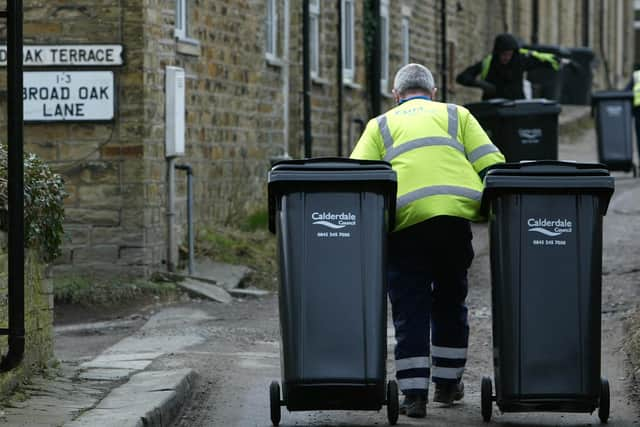How COVID-19 impacted on Calderdale waste services in 2020
and live on Freeview channel 276
A Freedom of Information Act request showed that compared to 2018 and 2019, the first eight months of 2020 saw the rate increase.
Collecting waste and recycling costs Calderdale Council £5 million, or £96,000 a week, with the service contracted out to Suez.
Advertisement
Hide AdAdvertisement
Hide AdThe FOI request shows missed collections of all services were 3,294 in 2018, 3,753 in 2019 and 4,247 up to the end of August 2020.


The pandemic has seen increases in some types of recycling and unusual impacts include vehicles parked on streets blocking access resulting from more people working from home.
The contractors are responsible for collecting any missed bins, with collections made by the same crew that missed the original collection, so no additional vehicles are used.
In turn, these are covered by the overall cost of the contract, so missed collections do not cost the council extra money to recover.
Advertisement
Hide AdAdvertisement
Hide AdCalderdale Council’s Cabinet member for Public Services and Communities Coun Jenny Lynn said COVID-19 had undoubtedly caused extra challenges for the council’s waste and recycling service through 2020.
It had seen huge increases in volumes of recycling presented for collection since the first lockdown began in March.
“Whilst we’re grateful for residents’ efforts to recycle wherever possible – which sees us consistently placed in the top West Yorkshire authorities for recycling performance – this has caused some issues with collections,” she said.
The amount of waste material collected peaked in June and July then eased slightly in the pre-Christmas autumn months but still continued to be higher than the average pre-COVID periods.
Advertisement
Hide AdAdvertisement
Hide Ad“We’ve seen the biggest increase in the amount of glass collected, with over 600 tonnes collected each month – to put this in context, this is the equivalent of 1.5 million wine bottles,” said Coun Lynn.
Waste and recycling crews worked hard to manage this increase, however having larger amounts to collect took longer and needed more trips to the depot.
That made it difficult to stick to usual schedules and in some cases these delays have been reported as missed collections.
Coun Lynn (Lab, Park) said the council understood the frustration it caused for residents and even using weekend catch-up crews, it had not always been possible to complete collections.
Advertisement
Hide AdAdvertisement
Hide AdOther factors which would not have the same impact in “normal” times included more cars remaining parked on streets while people worked from home during the pandemic, in some cases blocking access to vehicles which needed plenty of room to manoeuvre.
“We request that residents parking on roads help to keep access as clear as possible by parking away from the ends of, or opposite junctions, avoiding double parking and folding wing mirrors in,” said Coun Lynn.
Comment Guidelines
National World encourages reader discussion on our stories. User feedback, insights and back-and-forth exchanges add a rich layer of context to reporting. Please review our Community Guidelines before commenting.